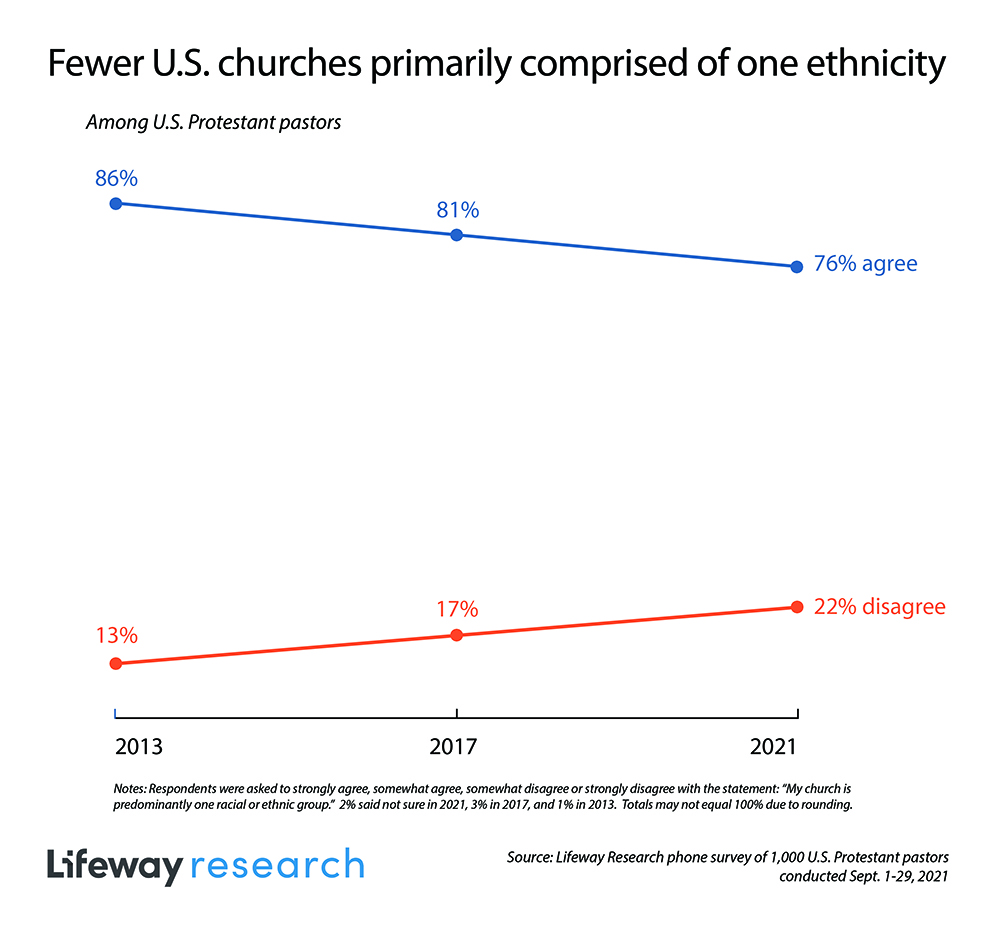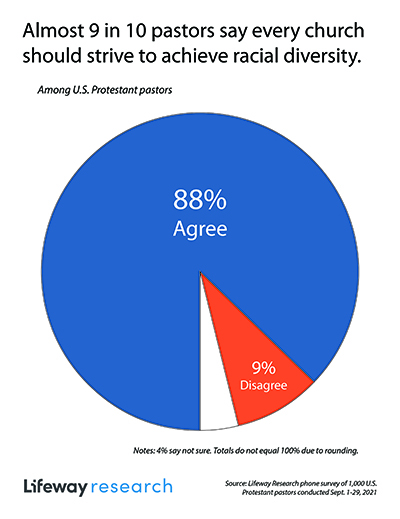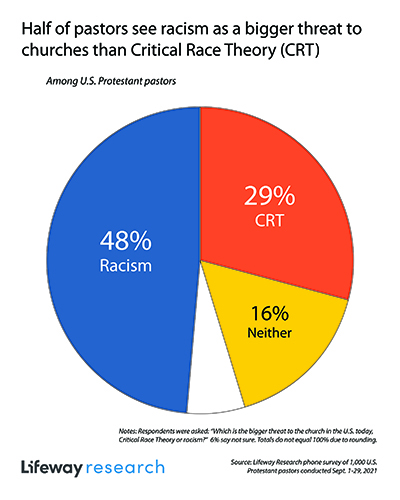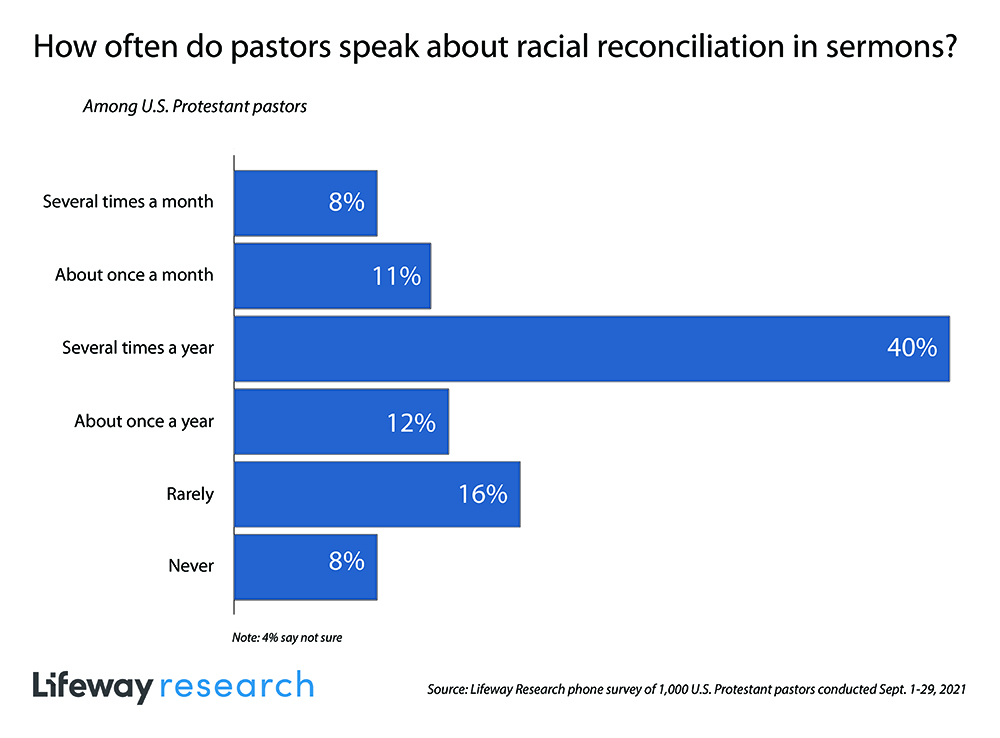NASHVILLE, Tenn.—Most Protestant pastors say every church should strive to achieve racial diversity, but few are achieving it.
Lifeway Research surveyed 1,000 Protestant pastors to learn their views on race and racial reconciliation in the church. The findings reveal some gaps among churches, including the difference between what pastors say they want for their churches as far as racial diversity and what their churches actually look like.
There also are differences between what African American pastors are doing to lead their churches toward racial reconciliation and what steps white pastors are taking toward this end.
“For years, pastors have expressed a desire to have more ethnically diverse churches,” said Scott McConnell, executive director of Lifeway Research. “So, every few years, we want to check in on the progress they’re making toward achieving that goal.”
Some progress noted
Churches aren’t often racially diverse. Most Protestant pastors in the United States say their churches are predominantly one racial or ethnic group (76 percent). There has been some progress over the past five years, however, as more pastors say there is at least some racial or ethnic diversity in their churches today (22 percent) than said so in a 2017 Lifeway Research study (17 percent).
There are a few indicators of churches that are most likely to be predominantly one racial or ethnic group. White pastors are more likely than pastors of any other race to say their churches predominantly represent one racial or ethnic group.
Furthermore, the more education a pastor has, the more likely that pastor’s congregation is to consist of predominantly one racial or ethnic group. Pastors with master’s degrees are most likely to pastor primarily monoracial churches (82 percent) with the likelihood decreasing among pastors who have a bachelor’s degree (73 percent) or no college degree (66 percent).
Pastors in the West are most likely to say they lead multiracial churches (36 percent).
Pastors say they desire racial diversity
Despite the reality that most churches are made up of predominantly one racial or ethnic group, most pastors think racial diversity should be a goal for their churches.
Sign up for our weekly edition and get all our headlines in your inbox on Thursdays
 Today, 88 percent of Protestant pastors say every church should strive to achieve racial diversity. That’s a noticeable decrease from the 93 percent who said the same in 2017. This drop is seen most clearly when looking at the number of Protestant pastors who strongly agree that every church should strive to achieve racial diversity.
Today, 88 percent of Protestant pastors say every church should strive to achieve racial diversity. That’s a noticeable decrease from the 93 percent who said the same in 2017. This drop is seen most clearly when looking at the number of Protestant pastors who strongly agree that every church should strive to achieve racial diversity.
Whereas 80 percent of pastors strongly agreed with this statement in 2017, only 68 percent strongly agree today. At the same time, there was an increase in pastors who somewhat agree from 2017 (13 percent) to 2021 (20 percent).
Although the majority of pastors across every age demographic say churches should strive for racial diversity, the youngest demographic of pastors (those age 18-44) are more likely to say they want racially diverse churches (91 percent) than older pastors (86 percent).
Mainline pastors are also more likely to agree churches should strive for racial diversity (93 percent) than evangelical pastors (86 percent). And pastors in the South are more likely to agree (90 percent) than those in the West (83 percent).
“The peak of pastor aspiration for more racial diversity in churches was measured just days after a white supremacist rally in Charlottesville, Va., in 2017 where clashes with opponents ended in deaths and injuries,” McConnell said. “While such events that year reminded pastors of the need for progress on racial reconciliation, there remains a consensus among pastors that this unity should be seen within their churches each week.”
Is critical race theory a great concern?
 With recent rises in conversations surrounding critical race theory, some might expect it to be a larger concern than racism for pastors. However, more pastors (48 percent) say racism is the bigger threat to the church in the United States today than critical race theory (29 percent). Another 16 percent of pastors say neither is a threat to the church, while 6 percent aren’t sure.
With recent rises in conversations surrounding critical race theory, some might expect it to be a larger concern than racism for pastors. However, more pastors (48 percent) say racism is the bigger threat to the church in the United States today than critical race theory (29 percent). Another 16 percent of pastors say neither is a threat to the church, while 6 percent aren’t sure.
Pastors with a master’s degree (60 percent) or a doctoral degree (54 percent) are more likely to consider racism the bigger threat to the church than pastors with no college degree (28 percent) or a bachelor’s degree (38 percent).
Pastors aged 18 to 44 (56 percent) and 55 to 64 (51 percent) are more likely to say racism is the bigger threat to churches than pastors over the age of 65 (37 percent). Mainline pastors (70 percent) are significantly more likely to say racism is the more significant threat than evangelical pastors (38 percent).
Preaching on racial reconciliation
One way pastors are addressing issues of racism and racial reconciliation in the church is by preaching on the topic. According to the study, 40 percent of pastors say they preach on racial reconciliation several times a year, with 19 percent saying they preach on it at least once a month. In 2014, 35 percent of pastors said they preached on racial reconciliation several times a year.
Although the number of pastors who preach on racial reconciliation at least several times a year has increased slightly since 2014 from 55 percent to 60 percent, 25 percent of pastors still say they rarely or never preach on racial reconciliation.
“Attitudes, cultural traditions and friendships within the community do not change by themselves,” McConnell said. “If someone doesn’t call for change, it won’t happen. Most pastors are casting this vision, but about a quarter of pastors aren’t.”
Pastors 54 and younger are more likely to say they preach on racial reconciliation several times a year (44 percent) than pastors over 65 (32 percent). Likewise, pastors with a master’s degree (48 percent) or a doctorate (43 percent) are more likely to say they preach on racial reconciliation several times a year than pastors with a bachelor’s degree (27 percent).
More than any other group, African American pastors (97 percent) see the need for racial diversity within the church, and they want to see the church striving to achieve such diversity. Meanwhile, 87 percent of white pastors and 83 percent of pastors of other ethnicities say the same.
African American pastors are also the most likely to say they preach on racial reconciliation several times a month (21 percent).
Not only do these pastors want racial diversity within churches, but they also see racism as an acute threat to churches. African American pastors are the group most likely to select racism (74 percent) and least likely to select critical race theory (15 percent) as the greater threat to the church in the United States today.
“Nobody expects the color of churches to change overnight, but the appearance of more integrated churches is just barely noticeable over the last decade,” McConnell said. “The hard work of investing in relationships across ethnic lines and setting aside attendees’ cultural preferences to welcome others is still the exception.”
Lifeway Research conducted the phone survey of 1,000 Protestant pastors Sept. 1–29, 2021, using a stratified random sample drawn from a list of all Protestant churches. Analysts weighted responses by region and church size to reflect the population more accurately. The completed sample is 1,000 surveys, providing 95 percent confidence the sampling error does not exceed plus or minus 3.2 percent. Margins of error are higher in sub-groups.















We seek to connect God’s story and God’s people around the world. To learn more about God’s story, click here.
Send comments and feedback to Eric Black, our editor. For comments to be published, please specify “letter to the editor.” Maximum length for publication is 300 words.